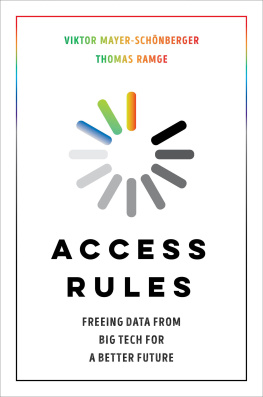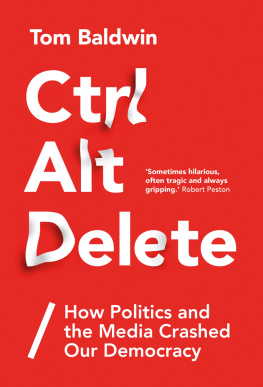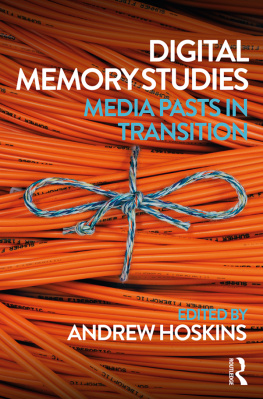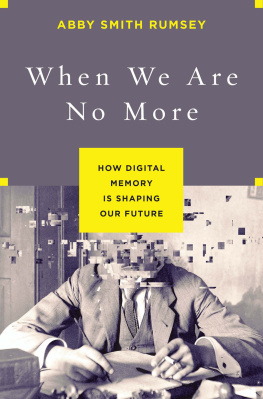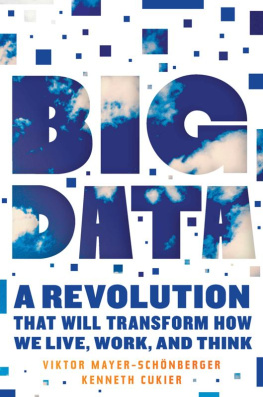delete
VIKTOR MAYER-SCHNBERGER
delete
The Virtue of Forgetting
in the Digital Age
With a new afterword
by the author
Princeton University Press
Princeton and Oxford
Copyright 2009 by Princeton University Press
Published by Princeton University Press, 41 William
Street, Princeton, New Jersey 08540
In the United Kingdom: Princeton University Press,
6 Oxford Street, Woodstock, Oxfordshire OX20 1TW
press.princeton.edu
All Rights Reserved
Fourth printing, and first paperback printing, with a
new afterword, 2011
Paperback ISBN 978-0-691-15036-9
The Library of Congress has cataloged the cloth edition
of this book as follows
Mayer-Schnberger, Viktor.
Delete : the virtue of forgetting in the digital age / Viktor
Mayer-Schonberger.
p. cm.
Includes bibliographical references and index.
ISBN 978-0-691-13861-9 (hardback : alk. paper)
1. Memory. 2. Computer storage devices.
3. InternetSocial aspects. 4. Persistence. I. Title.
BF371.M375 2009
153.125dc22 2009014441
British Library Cataloging-in-Publication Data is
available
This book has been composed in Minion
Printed on acid-free paper.
Printed in the United States of America
5 7 9 10 8 6 4
To Birgit
Contents
CHAPTER I
Failing to Forget the Drunken Pirate
CHAPTER II
The Role of Remembering and the Importance of Forgetting
CHAPTER III
The Demise of Forgettingand Its Drivers
CHAPTER IV
Of Power and TimeConsequences of the Demise of Forgetting
CHAPTER V
Potential Responses
CHAPTER VI
Reintroducing Forgetting
CHAPTER VII
Conclusions
Acknowledgments
It all began with a half page of notes titled the right to be forgotten in February of 2007. I quickly forgot about the notes, but remembered the idea. When journalist and friend Kenneth N. Cukier called to ask for new perspectives on ubiquitous computing and privacy, I pitched to him the importance of forgetting, and he included it in his report. My April 2007 working paper was quickly picked up by the media, somewhat to my surprise. My idea seemed to have hit a nerve. In the two years since my argument evolved, my idea has spread, and to my delight many others have advocated it or proposed something similar.
Among the circle of privacy experts and practitioners that provided me with valuable information, I especially would like to thank Jeffrey Friedberg and Paul Schwartz. Elena Saprykina helped me with Russian history. Marc Rotenberg, Nicklas Lundblad, and Philipp Mller offered succinct and valuable criticism. Edward Felten, Jean-Franois Blanchette, and Liam Bannon, who all have written eloquently about aspects of forgetting and memory, provided me with helpful pointers and offered most appreciated insights. My colleague at the I+I Policy Research Centre, Tracy Loh, read the entire manuscript and offered many valuable comments throughout. Ron Burt and Michael Curry deserve a special thank you; they took the time to read my argument and commented on it extensively with their inimitable mix of powerful encouragement and thought-provoking insights. I also would like to thank three anonymous reviewers for their very helpful suggestions. I surely have failed them for not fully incorporating in my revisions all of their many helpful suggestions.
I was fortunate to present (and hone!) my argument to diverse audiences around the world. Special thanks to Jean-Franois Blanchette and his colleagues at UCLA, Tom Bruce and his colleagues at Cornell, Thomas Hoeren and his staff at ITM in Mnster, Doris Obereder and her colleagues at Ars Electronica, and Markus Beckedahl for re:publica08. Equally important, I benefited substantially from my many conversations with traditional and new media journalists around the world over the last two years; their questions helped me sharpen and develop my argument. In particular, Nate Anderson of Ars Technica, Lee Gomes of The Wall Street Journal, Clark Hoyt of The New York Times, and Kai Biermann of the German weekly Die Zeit all helped me see important aspects of my narrative that I had not been aware of before. I am encouraged by Alejandro Tortolini and Enrique Quagliano, and their campaign in Argentina to reinvent forgetfulness, and Bill Straus, who as a legislator aims for the same in Massachusetts.
If this book has an instigator, it is Tim Sullivan. Tim, a superb editor, was the first to get me thinking about turning my narrative into a book. Even after his departure from Princeton University Press, he continued to follow my progress. After Tims departure, Chuck Myers guided this project with tremendous verve and thoughtfulness, and I thank him very much for taking on this book project midway and seeing it through.
It is befitting for a book about the virtues of forgetting that I now fail to remember much of the pains of writing it. I dedicate this book to Birgit Rabl, who has not only been its first reader (and critic), but who simply is the love of my life.
Singapore, January 2009
delete
CHAPTER I
Failing to Forget the
Drunken Pirate
Stacy Snyder wanted to be a teacher. By spring of 2006, the 25-year-old single mother had completed her coursework and was looking forward to her future career. Then her dream died. Summoned by university officials, she was told she would not be a teacher, although she had earned all the credits, passed all the exams, completed her practical trainingmany with honors. She was denied her certificate, she was told, because her behavior was unbecoming of a teacher. Her behavior? An online photo showed her in costume wearing a pirates hat and drinking from a plastic cup. Stacy Snyder had put this photo on her MySpace web page, and captioned it drunken pirate, for her friends to see and perhaps chuckle over. The university administration, alerted by an overzealous teacher at the school where Stacy was interning, argued that the online photo was unprofessional since it might expose pupils to a photograph of a teacher drinking alcohol. Stacy considered taking the photo offline. But the damage was done. Her page had been catalogued by search engines, and her photo archived by web crawlers. The Internet remembered what Stacy wanted to have forgotten.
This case, however, is not about the validity (or stupidity) of the universitys decision to deny Stacy her certificate. It is about something much more important. It is about the importance of forgetting.
Since the beginning of time, for us humans, forgetting has been the norm and remembering the exception. Because of digital technology and global networks, however, this balance has shifted. Today, with the help of widespread technology, forgetting has become the exception, and remembering the default. How and why this happened, what the potential consequences are for us individually and for our society, and whatif anythingwe can do about it, is the focus of this book.
For some, Stacy Snyders case may sound exceptional, but it is not. Dozens of cases of profound embarrassment, and even legal action, have occurred since thenfrom the attorney who cannot get the Internet to forget an article in a student newspaper more than a decade ago to a young British woman who lost her job because she mentioned on Facebook that her job was boring. As these young people grow older, and more adults adopt similar traits, Stacy Snyders case will become paradigmatic, not just for an entire generation, but for our society as a whole.
Web 2.0 has fueled this development, but conventional publishingpaired with the power of the Internethas rendered surprisingly similar results. Take the case of Andrew Feldmar, a Canadian psychotherapist in his late sixties living in Vancouver.however, a border guard queried an Internet search engine for Feldmar. Out popped an article Feldmar had written for an interdisciplinary journal in 2001, in which he mentioned he had taken LSD in the 1960s. Feldmar was held for four hours, fingerprinted, and after signing a statement that he had taken drugs almost four decades ago, was barred from further entry into the United States.
Next page

